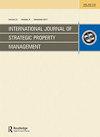考察巴西金融服务业企业社会责任实践与企业声誉之间的关系
IF 1.7
4区 管理学
Q3 MANAGEMENT
引用次数: 0
摘要
目的:本研究的目的是研究巴西金融服务业企业社会责任实践与企业声誉之间的关系 方法学:本研究采用桌面方法学。案头研究指的是二手数据或不需要实地调查就能收集到的数据。案头调查基本上涉及从现有资源中收集数据,因此,与实地调查相比,案头调查通常被认为是一种成本较低的技术,因为主要费用是行政人员的时间、电话费和通讯录。因此,这项研究依赖于已经发表的研究、报告和统计数据。这些辅助数据很容易通过在线期刊和图书馆获得 研究结果:研究巴西金融服务业企业社会责任(CSR)实践与企业声誉之间的关系,发现这两个变量之间存在很强的正相关关系。据观察,积极参与企业社会责任计划的金融公司在利益相关者(包括客户、投资者和公众)中的声誉显著提高。这种积极的声誉归因于对道德和社会责任行为的感知,最终导致客户的信任和忠诚度增加,并改善了参与企业社会责任活动的公司的财务绩效。 对理论、实践和政策的独特贡献:利益相关者理论、合法性理论和合法性理论可以用来锚定未来研究巴西金融服务业企业社会责任实践与企业声誉之间的关系。定期、详细和标准化的企业社会责任报告可以提高利益相关者的信任,并帮助投资者做出明智的决策。与监管机构和行业协会合作,为金融服务行业的企业社会责任实践建立一个全面的监管框架。本文章由计算机程序翻译,如有差异,请以英文原文为准。
Examining the Relationship between Corporate Social Responsibility Practices and Firm Reputation in the Financial Services Sector in Brazil
Purpose: The aim of the study was to Examine the Relationship between Corporate Social Responsibility Practices and Firm Reputation in the Financial Services Sector in Brazil
Methodology: The study adopted a desktop methodology. Desk research refers to secondary data or that which can be collected without fieldwork. Desk research is basically involved in collecting data from existing resources hence it is often considered a low cost technique as compared to field research, as the main cost is involved in executive’s time, telephone charges and directories. Thus, the study relied on already published studies, reports and statistics. This secondary data was easily accessed through the online journals and library
Findings: The study examining the relationship between Corporate Social Responsibility (CSR) practices and firm reputation in the financial services sector in Brazil found a strong positive correlation between the two variables. Financial firms that actively engaged in CSR initiatives were observed to have significantly enhanced their reputation among stakeholders, including customers, investors, and the public. This positive reputation was attributed to the perception of ethical and socially responsible behavior, ultimately leading to increased trust and loyalty from clients and improved financial performance for the firms involved in CSR activities.
Unique Contribution to Theory, Practice and Policy: The stakeholder theory, legitimacy theory and legitimacy theory may be used to anchor future studies on the examining the relationship between corporate social responsibility practices and firm reputation in the financial services sector in Brazil. Regular, detailed, and standardized reporting on CSR initiatives can improve stakeholder trust and help investors make informed decisions. Collaborate with regulators and industry associations to establish a comprehensive regulatory framework for CSR practices in the financial services sector.
求助全文
通过发布文献求助,成功后即可免费获取论文全文。
去求助
来源期刊
CiteScore
4.00
自引率
18.50%
发文量
23
审稿时长
15 weeks
期刊介绍:
International Journal of Strategic Property Management is a peer-reviewed, interdisciplinary journal which publishes original research papers. The journal provides a forum for discussion and debate relating to all areas of strategic property management. Topics include, but are not limited to, the following: asset management, facilities management, property policy, budgeting and financial controls, enhancing residential property value, marketing and leasing, risk management, real estate valuation and investment, innovations in residential management, housing finance, sustainability and housing development, applications, etc.

 求助内容:
求助内容: 应助结果提醒方式:
应助结果提醒方式:


